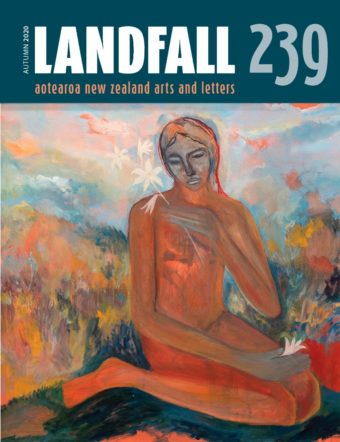In her report on the 2020 Charles Brasch Young Writers’ Essay Competition, Landfall editor Emma Neale describes the predicament of choosing a winner from an unspecified number of entries. How to compare a formal academic essay, she asks, with a ‘lyrical, sensuous, song-like study of the place of the pomegranate in myth and art’? How to separate ‘one potent impression from another in a diverse field’? As judge, Neale puts her stake in the ground. The most gripping essays, she says, have motion. They develop or travel somewhere. They chart a change of some kind. With this in mind she gives first prize to ‘Body/Love’, a short synopsis of the experience of anorexia by Auckland literature student Grace Lee. Included here, it is a deserving recipient. Lee sheers in close to the forlorn metaphor of ‘swallowing whole’ the myth of a perfect, spare body before swerving back out to the ‘rail-thin’ beauty of David Bowie and the rough skeleticism of Giacometti’s sculpted figures. Lee’s touch is razor-sharp but also conjectural, hopeful, as she veers between bruising subjectivity and succinct observation. It is tempting to draw a connection with the fey femininity of the cover painting by Star Gossage, a young woman, kneeling, naked, demure (I have sung my way through this world, 2018) but Landfall will not be confined to theme or place. Like the entries in the essay competition, the 13 short stories, two essays, 40 poems, six reviews and three art portfolios that make up the latest issue of Landfall occupy an open – although almost completely ahistorical – field with no clear boundary lines, no stated goalposts.
If there is a defining feature of this issue, it is Lee’s sense of glancing in and around her subject, plunging in close then arching away into a place more detached, more ironic. Perhaps it is because of the virus, its heels dragging through a sodden winter, that the most compelling of these contributions hover close to death. Wellington scriptwriter Sarah Harpur’s excellent ‘Dead Dads Club’, which began life as a comedy show, succinctly muddies Elisabeth Kubler-Ross’s neat catalogue of grief. In poetry, Johanna Emeney’s ‘Myxomatosis’ takes us close to the ‘leprous eyelids’ of a rabbit dying from the introduced virus; in Jo-Ella Sarich’s ‘The Jasmine (We need to talk about suicide)’ grief is inexpertly buried in a ‘pop-out storybook world’ of nesting birds, studious domesticity, a jasmine wrenched out by its roots. In Sarah Shirley’s ‘The Stag’ a hunter is felled by a heart attack as he sets his crosshairs on a stag: ‘I imagined your coughing bellow, your bugling laugh / as they fed coiled metal up my arm to open in my heart’; in ‘Legacy’ Nicola Thorstensen’s list of items left to her son slips tenderly, inexorably, from a recipe for kedgeree to ‘The cry of a lone albatross / the swell of an aria’; in ‘Demilune’ Tim Saunders elegantly marshals the spare facts of an unnamed uncle who flew sorties over Germany ‘under a scything moon’, who came home only half a man, who went missing beside the Oroua.
Some of the stories and poems work like efficient windscreen wipers, clearing the rain to bring the view into sharper – cleverer, truer – focus. The best however, lead us on a circuitous trip that deviates from the road ahead, that ambushes and waylays. ‘Green Dress’ by Patricia Grace is an outstanding story of the slow unravelling of family through the threads and threats that obscure psychological abuse. It is a spare, succinct and perfectly structured story of derailment and confrontation. This mixture of complexity and clarity is evident too in the gentle affinity between a grandmother and her grandson in Vincent O’Sullivan’s ‘Splinters’, and in Pip Robertson’s ‘Disaster Day’, in which a child’s night-time terrors form an inchoate soundtrack to daily deliberations on planetary extinction, suicide cults and school emergency drills for fire, earthquake, tsunami, terrorism.
In this issue, Landfall’s stated commitment to ‘cultural commentary’ is syphoned almost wholly through fiction and poetry, but it comes with a certain levity. In Stephanie Johnson’s The Pear Tree, Jena – overlooked by her husband, unseen by her boss, distanced from her children (at 35A John Key Close, the children reside in the far reaches of the house) – undergoes a height-altering, shape-shifting Alice-in-Wonderland transformation not unlike Yeong-hye’s hankering for plant-like transmutation in Han Kang’s The Vegetarian. In Jenna Heller’s story, Fanta Boy careers towards medical apocalypse on a daily diet of sugar hits, Snapchat and screen action; in ‘Barbara Eden’s Screams’, Gillian Roach casts a contemporary lens on the ‘weirdly erotic’ confines of the genie bottle in American ‘70s sitcom I Dream of Jeannie.
There is also a simple elegance in the best of these writings – in the ‘three-dimensional calligraphy’ of eels in ‘To Flute Music’ by Tony Beyer, in the haunting gaze of the hospital patient in Wes Lee’s ‘Suddenly the moon’, in Cilla McQueen’s ‘Adaptation’, her words dancing down a brief eight lines to arrive at a tiny oyster growing inside the remains of a washed-up Janola bottle; in Sarah Scott’s memorable opening to ‘Chrysanthemums’: ‘She lies dusking in the catkin dust / He looks up from his sketchbook’. In keeping with this evocative conciseness, artist Vita Cochran’s stitched panels steer the tradition of decorative embroidery into a Klee-like exploration of geometric abstraction. The resulting combination of brevity and digression, an apt analogy for this wintry edition of Landfall, is an invitation to see more.
This review was originally published on the Academy of NZ Literature site.



